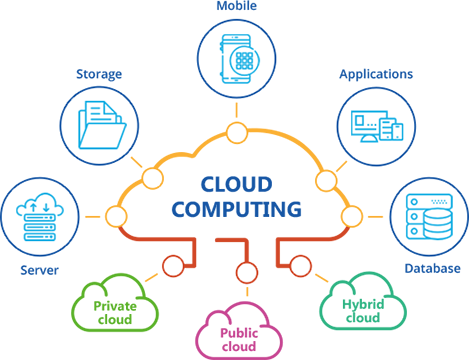Ultimate Guide to LinkDaddy Cloud Services: Increasing Your Online Existence
Ultimate Guide to LinkDaddy Cloud Services: Increasing Your Online Existence
Blog Article
Flexible and Dependable: The Future of Cloud Provider
In the ever-evolving landscape of technological innovations, cloud services have become a cornerstone for contemporary businesses seeking adaptability and reliability. The collaborating mix of scalability, safety and security, and assimilation with cutting-edge innovations paints an encouraging picture of what the future holds for cloud services. As companies increasingly count on cloud options to drive innovation and effectiveness, a much deeper expedition into the transformative possibility of these solutions is vital for those intending to browse the intricacies of a digital-first globe.
Advantages of Cloud Services
Cloud services use unrivaled scalability and flexibility, making it possible for services to adjust rapidly to changing demands and maximize source allocation effectively. One key benefit of cloud services is cost-effectiveness. linkdaddy cloud services press release. By moving to a pay-as-you-go design, services can decrease upfront software and hardware expenses, along with recurring upkeep costs. This adaptability enables firms to scale their sources up or down based on real use, avoiding the need to buy excess ability.
Another benefit is enhanced protection and integrity. Cloud provider invest greatly in state-of-the-art safety steps to shield information from violations and guarantee continuous operation through repetitive systems and backups. This degree of protection is commonly beyond what lots of organizations can afford to apply by themselves. Cloud services provide improved partnership and ease of access. With data kept in the cloud, workers can access details from anywhere, at any type of time, promoting partnership and productivity. Furthermore, cloud solutions usually feature built-in partnership tools that enhance interaction and task management.
Scalability and Flexibility
With the raising demand for dynamic source allotment and adaptable infrastructure in the electronic age, the principle of scalability and elasticity has actually come to be paramount in contemporary organization procedures. Scalability describes the capability of a system to take care of expanding amounts of work by including resources to the existing framework. Cloud solutions supply services the flexibility to scale up or down based upon fluctuating needs, enabling cost-efficient operations. Flexibility, on the various other hand, exceeds scalability by allowing automated adjustments in real-time to meet need spikes without hand-operated intervention. This feature guarantees smooth efficiency throughout peak usage durations without over-provisioning sources.
Cloud companies offer elastic and scalable solutions through features like auto-scaling, which instantly adjusts resources based on predefined metrics, guaranteeing optimal performance whatsoever times. This ability is specifically beneficial for businesses with uncertain workloads or seasonal variations in need. By leveraging the scalability and flexibility of cloud solutions, organizations can effectively handle their sources, enhance operational effectiveness, and boost client contentment.
Safety and Conformity Actions
Cloud service carriers have to prioritize protection to safeguard versus cyber dangers and information violations. Security, multi-factor authentication, and normal protection audits are important elements of an extensive security strategy.

Combination With Arising Technologies
Combination of emerging technologies plays an essential role in shaping the future landscape of cloud services. As cloud computing remains to progress, the integration of technologies such as expert system (AI), Web of Things (IoT), edge computing, and blockchain is coming to be progressively crucial. AI-powered formulas can enhance cloud solutions by boosting automation, predictive analytics, and personalization. IoT gadgets create substantial amounts of check it out information that can be efficiently processed and evaluated in the cloud, making it possible for real-time insights and decision-making. Side computing complements cloud services by making it possible for data processing closer to the resource, minimizing latency and improving general performance. Blockchain technology makes certain enhanced safety and transparency in cloud transactions, making it an important addition to cloud services. By integrating these arising innovations into cloud settings, organizations can open brand-new capabilities, boost performance, and provide cutting-edge options to satisfy the needs of the ever-changing electronic landscape.

Advancing Fads in Cloud Adoption
Amidst the dynamic landscape of technology developments, the fostering of cloud solutions is witnessing a remarkable change driven by advancing fads. Organizations are significantly moving in the direction of hybrid and multi-cloud cloud solutions to satisfy their diverse requirements. Multi-cloud techniques include making use of solutions from several cloud carriers, permitting business to utilize the unique offerings of each company while staying clear of supplier lock-in. On the other hand, crossbreed cloud options provide a blend of on-premises infrastructure and exclusive or public cloud solutions, giving versatility and scalability.
Moreover, there is a growing focus on edge computer, where data processing is performed closer to the information resource instead than relying upon a central cloud server. This trend is specifically crucial for applications needing real-time data processing, informative post allowing quicker decision-making and minimizing latency.
Additionally, the adoption of serverless computing is obtaining traction, allowing companies to concentrate on writing and releasing code without the need to handle underlying framework. This pattern provides cost-efficiency and scalability advantages, driving more organizations towards serverless designs. Overall, these advancing patterns in cloud adoption signify a critical shift in the direction of even more flexible, reliable, and customized cloud remedies.
Final Thought
In final thought, the future of cloud solutions is promising due to its flexibility, safety, dependability, and scalability procedures. The integration with arising innovations additionally boosts its capabilities, making it crucial for companies looking for to stay affordable in the electronic period. As organizations proceed to embrace cloud services for their operations, the advancement of cloud technology will certainly shape the way businesses run and are successful in the ever-changing digital landscape.
The collaborating blend of scalability, safety and security, and combination with sophisticated modern technologies paints an encouraging photo of what the future holds for cloud services. Blockchain technology guarantees improved protection and transparency in cloud transactions, making it a valuable enhancement to shadow solutions. Cloud Services. On the other hand, hybrid cloud services offer a mix of on-premises facilities and personal or public cloud services, offering flexibility and scalability
In general, these evolving fads in cloud fostering represent a calculated change towards even more versatile, efficient, and customized cloud remedies.
As organizations proceed to embrace cloud solutions for their procedures, the development of cloud technology will undoubtedly form the method companies run and prosper in the ever-changing electronic landscape.
Report this page